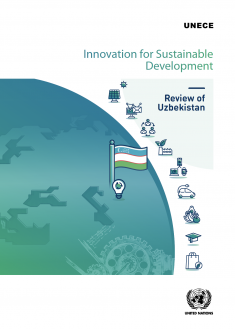
Uzbekistan has made important recent progress in liberalizing its economy for trade and investment, spurring economic growth and creating significant reform momentum for sustainable development and the transition towards a circular economy, in line with United Nations Agenda 2030. Innovation plays an important role in these efforts, as it is essential to building a competitive economy and addressing contemporary challenges, such as environmental sustainability, unemployment, and poverty reduction. Encouraging experimentation and collaboration for innovation and fostering the absorption of new knowledge and technologies will enable new ways to create value and enhance Uzbekistan’s capacity to withstand externally induced shocks such as the COVID-19 pandemic.
In recent years, Uzbekistan has put innovation-led growth high on the political agenda. The country established the Ministry of Innovative Development and introduced new legislation as well as various support mechanisms to promote start-up creation and entrepreneurship. To ensure environmental sustainability and mitigate the Aral Sea crisis, the country has also made positive efforts in addressing environmental challenges through innovation, for example, by declaring the Aral Sea a Zone of Environmental Innovations and Technologies.
While these efforts are commendable and show strong social and political commitment to innovation, much of the country’s potential for innovation – including through the strong legacy in research and a large, young population – remains untapped. Gaps remain in innovation policy coordination and the coherence of legal frameworks, infrastructural elements of the innovation ecosystem are not yet fully developed, and current capacities of research and development organizations and the private sector do not yet fully exploit opportunities to ensure technology upgrading and knowledge transfer in the private sector. In addition, firms will require strengthened capacities to import, absorb and adapt innovation from abroad, namely products, services and processes that have already worked successfully elsewhere and can facilitate the creation of new ways for creating value for sustainable development. For Uzbekistan to ensure long-term growth and to capitalize on the reform momentum gained, it needs to foster systematic experimentation with new ideas to diversify and modernize the economy by introducing policies and institutions to effectively support this dynamic.
This publication provides an in-depth analysis of the challenges and opportunities to innovation-driven sustainable development in Uzbekistan and provides targeted recommendations to enhance the resources, capacities and infrastructures needed to ensure resilient and inclusive growth of the economy. It is the result of a concerted, comprehensive approach with systematic stakeholder engagement and peer review and builds on the third UNECE Environmental Performance Review of Uzbekistan, as well as ongoing activities and support initiatives of UN partner organisations in Uzbekistan, including UNESCO and the World Bank.
UNECE advisory work in the field of innovation draws on longstanding engagement across the countries of Central Asia and serving as a change management tool for policymakers, this publication is complementary to additional support to innovation-led growth of Uzbekistan under the United Nations Special Programme for the Economies of Central Asia (SPECA) programme and new potential sub-regional initiatives, such as a Sub-regional Innovation Policy Outlook in Central Asia.
The project was made possible through cooperation with the Ministry of Innovative Development of Uzbekistan.

